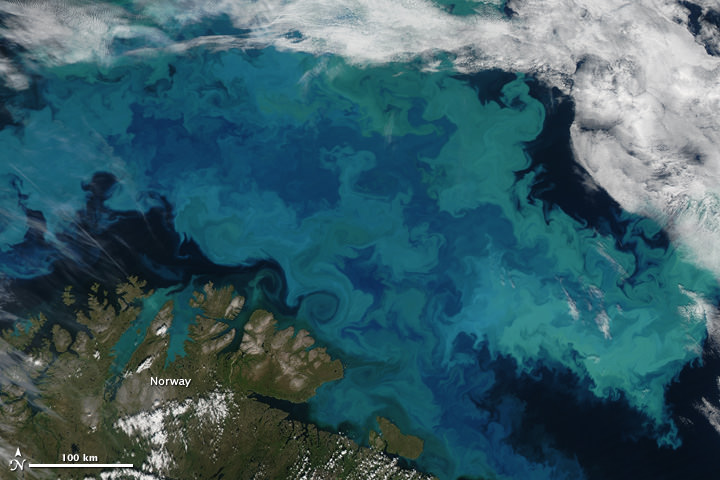[/caption]
Phytoplankton are tiny, microscopic plant-like organisms, but when they get together and start growing they can cover hundreds of square kilometers and be easily visible in satellite images. This image of the Barents Sea was taken on August 14, 2011 by the Moderate Resolution Imaging Spectroradiometer (MODIS) on the Aqua satellite. When conditions are right, phytoplankton populations can grow explosively, a phenomenon known as a bloom. A bloom may last several weeks, but the life span of any individual phytoplankton is rarely more than a few days. The area in this image is immediately north of the Scandinavian peninsula. Blooms spanning hundreds or even thousands of kilometers occur across the North Atlantic and Arctic Oceans every year. But, said Jeff Schmaltz from NASA’s Earth Observatory website, seeing such a wide area without clouds during the bloom is a rare treat.
Phytoplankton thrive in cold ocean waters, which tend to be rich in nutrients. Schmaltz said the milky blue color is an indicator that the bloom probably contains coccolithophores, which are plated with white calcium carbonate. Seen through ocean water, a coccolithophore bloom is bright blue. Other shades may be from other species of phytoplankton.
Source: NASA’s Earth Observatory website


You can’t imagine how relieved I am that you didn’t mention global warming. I expected it more and more with every sentence. Then I realized… you’re Universe Today, not my average news channel!
But, ren00r… it goes without saying…
This phytoplankton thrives in cold water… and everybody knows that global warming warms/cools everything.
But, ren00r… it goes without saying…
This phytoplankton thrives in cold water… and everybody knows that global warming warms/cools everything.
How many fractal types can you see in this…?
An hypothesis maybe worth considering is that this bloom is due to the growth in nutrients from permafrost melting. If this were shown to be the case it would actually bolster the case for climate warming.
LC